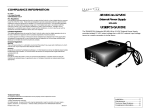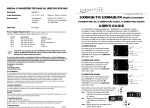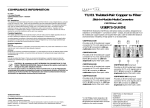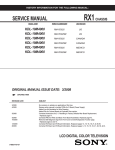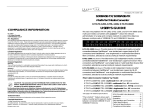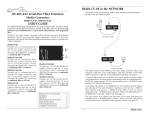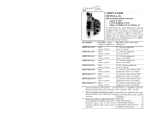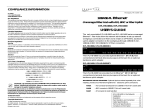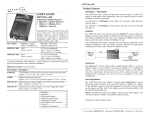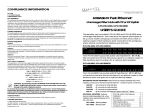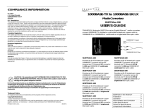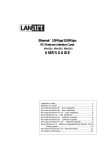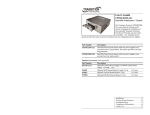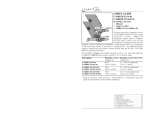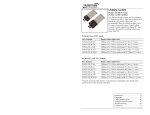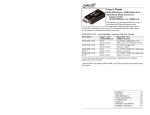Download Transition Networks SSDTF1011-100 User's Manual
Transcript
COMPLIANCE INFORMATION T1/E1 Twisted-Pair Copper to Fiber Media Converters FCC Regulations Canadian Regulations This digital apparatus does not exceed the Class A limits for radio noise for digital apparatus set out on the radio interference regulations of the Canadian Department of Communications. Le présent appareil numérique n'émet pas de bruits radioélectriques dépassant les limites applicables aux appareils numériques de la class A prescrites dans le Règlement sur le brouillage radioélectrique édicté par le ministère des Communications du Canada. European Regulations Warning This is a Class A product. In a domestic environment this product may cause radio interference in which case the user may be required to take adequate measures. Achtung ! Dieses ist ein Gerät der Funkstörgrenzwertklasse A. In Wohnbereichen können bei Betrieb dieses Gerätes Rundfunkstörungen auftreten, in weichen Fällen der Benutzer für entsprechende Gegenmaßnahmen werantwortlich ist. Attention ! Ceci est un produit de Classe A. Dans un environment domestique, ce produit risque de créer des interférences radioélectriques, il appartiendra alors à l’utilsateur de prende les measures spécifiques appropriées CAUTION: RJ connectors are NOT INTENDED FOR CONNECTION TO THE PUBLIC TELEPHONE NETWORK. Failure to observe this caution could result in damage to the public telephone network. Der Anschluss dieses Gerätes an ein öffentlickes Telekommunikationsnetz in den EG-Mitgliedstaaten verstösst gegen die jeweligen einzelstaatlichen Gesetze zur Anwendung der Richtlinie 91/263/EWG zur Angleichung der Rechtsvorschriften der Mitgliedstaaten über Telekommunikationsendeinrichtungen einschliesslich der gegenseitigen Anerkennung ihrer Konformität. SSDTF10xx*-100 USER’S GUIDE TRANSITION Networks SSDTF10xx-100 series media converters encode and decode T1 or E1 twisted-pair copper signals over duplex fiber-optic cable to extend the distance and transmission reliability of high speed T1 or E1 data traffic. SSDTF1011-100 Provides an RJ-45 twisted pair copper connector for T1 or E1 signals and a set of RX/TX ST connectors to 850 nm multimode duplex fiber-optic cable. SSDTF1012-100 Provides an RJ-45 twisted pair copper connector for T1 or E1 signals and an RX/TX ST connector to 1300 nm singlemode duplex fiber-optic cable. SSDTF1013-100 SSDTF1015-100 (long haul) Provides an RJ-45 twisted pair copper connector for T1 or E1 signals and an RX/TX SC connector to 850 nm multimode duplex fiber-optic cable. Provides an RJ-45 twisted pair copper connector for T1 or E1 signals and an RX/TX SC-LH connector to 1300 nm singlemode duplex fiber-optic cable. SSDTF1014-100 SSDTF1022-100 (long haul) Provides an RJ-45 twisted pair copper connector for T1 or E1 signals and an RX/TX SC-SM connector to 1300 nm singlemode duplex fiber-optic cable. Provides an RJ-45 twisted pair copper connector for T1 or E1 signals and an RX/TX ST connector to 1300 nm singlemode duplex fiber-optic cable. Trademark Notice All registered trademarks and trademarks are the property of their respective owners. Copyright Restrictions © 2001, 2002 TRANSITION Networks. All rights reserved. No part of this work may be reproduced or used in any form or by any means – graphic, electronic, or mechanical – without written permission from TRANSITION Networks. Printed in the U.S.A. 33202.C T!/E1 TP to Fiber Media Converter This equipment has been tested and found to comply with the limits for a class A digital device, pursuant to part 15 of the FCC rules. These limits are designed to provide reasonable protection against harmful interference when the equipment is operated in a commercial environment. This equipment generates, uses, and can radiate radio frequency energy and, if not installed and used in accordance with the instruction manual, may cause harmful interference to radio communications. Operation of this equipment in a residential area is likely to cause harmful interference, in which case the user will be required to correct the interference at the user’s own expense. 9-12 VDC INPUT UL Listed C-UL Listed (Canada) CISPR22/EN55022 Class A + EN55024 CE Mark *In SSDTF10xx model designation, 10 represents the T1 or E1 RJ-45 connector; xx represents the selectable fiber connector installed on the media converter. SSDTF10xx in the Network . . . . . . .2 Installation . . . . . . . . . . . . . . . . . . . .3 Operation . . . . . . . . . . . . . . . . . . . . .7 Fault Isolation and Correction . . . . .8 Cable Specifications . . . . . . . . . . . . .9 Technical Specifications . . . . . . . . .11 Compliance Information . . . . . . . . .12 SSDTF10xx IN THE NETWORK TECHNICAL SPECIFICATIONS Standards NOTE: THE SSDTF10xx REQUIRES A CSU BETWEEN THE MEDIA CONVERTER AND THE PUBLIC TELEPHONE NETWORK. T1/E1 Physical Layer: ITU-T, ANSI, AT&T, ETSI T1 Network Extension Dimensions 2.9" x 4.8" x 1.4" Weight 8 oz (approximate) Power Source 7.5-15.9 VDC AC Adapter Power Consumption 5 watts Power Supply Requirements Replace power supply with only the equivalent input rating (see below) and output rating (regulated 9VDC at 550 mA). TN PN Requirement Location 25034 or 3525 240 volts, 50 hertz United Kingdom 25034 or 3525 230 volts, 50 hertz Europe 3518 120 volts, 60 hertz USA/Canada/Mexico 3514 100 volts, 50-60 hertz Japan 25034 or 3525 240 volts, 50 hertz Australia Environment CSU LKF PWR DB-9 RXF RXC LKC FLNK CRX CLNK SPD PWR SPD PWR FRX FLNK FRX FLNK CRX CLNK CRX CLNK -20° to 85°C (-4° to 185°F) 100BASE-FX 10/100SX INIT 12C 10-90%, non condensing Altitude 0-10,000 feet RX TX PWR 10/100TX RX LNK 10BASE-T 12C-1 Humidity RX RX RX Typical Operating Temperature*: 0° to 50°C (32° to 122°F ) Storage Temperature: TX TX 100BASE-FX TERM 10BASE-FL RESET PWR FRX TX TX M10 ASTER SPD Emissions: CISPR A CETTF100 CFETF100 CFETF110 Warranty Lifetime DECLARATION OF CONFORMITY Name of Mfg: NOTE: T1/E1 MEDIA CONVERTERS MUST BE USED IN PAIRS. A TRANSITION Networks SSDTF10xx stand-alone media converter can be used with another SSDTF10xx stand-alone media converter, with a CSDTF10xx chassis media converter, or with a previous model TRANSITION Networks T1/E1 media converter, such as a C/T1E1-CF-01 or a T1E1-CF-01. Features • Media converter is framing independent (as ESF vs D4) and supports all common line codes, (AMI, B8ZS, HDB3). • Dry relay contacts allow media converter to be tied into separate alarm circuit • All Ones Insertion (AIS) on loss of signal at copper and/or fiber interface. Transition Networks 6475 City West Parkway, Minneapolis MN 55344 USA Model: SSDTF10xx Series Copper-to-Fiber Media Converter Part Number: SSDTF1011-100, SSDTF1012-100, SSDTF1013-100, SSDTF1022-100 Regulation: EMC Directive 89/336/EEC Purpose: To declare that the SSDTF10xx to which this declaration refers is in conformity with the following standards. EN 55022:1994; EN 55024:1998; FCC Part 15 Class A; EN 60950 A4:1997; UL 1950 I, the undersigned, hereby declare that the equipment specified above conforms to the above Directive(s) and Standard(s). _January 8, 2001_____ Stephen Anderson, Vice-President of Engineering Date CABLE SPECIFICATIONS (continued) Dry-Contact Relay RJ-45 dry-contact relay opens if power, signal detect/copper or signal detect/fiber are lost. Twisted-Pair Copper Cable Twisted pair connection requires two active pairs. The two active pairs in a T1/E1 network are pins 1 & 2 and pins 4 & 5. Use only dedicated wire pairs (such as blue/white & white/blue, orange/white & white/orange) for the active pins. Operational rating on pins 3 and 6: 0-30VDC maximum 1A Relay 3 Category 3 or better twisted-pair copper wire is required. Either shielded twisted-pair (STP) or unshielded twisted-pair (UTP) can be used. RJ-45 6 T1: Gauge Attenuation Differential Characteristic Impedance 24 to 22 AWG 2.6 dB/100 meters @ 1.0 MHz 100 Ω ±10% Switch-Selectable Configurations T1 COPPER RJ-45 E1: Gauge Attenuation Differential Characteristic Impedance 24 to 22 AWG 2.6 dB/100 meters @ 1.0 MHz 120 Ω ±10% Configured as either "long haul" or “short haul” on 100 ohm cable, with a variety of selectable distance settings. E1 COPPER RJ-45 Configured as either "long haul" or “short haul” on 120 ohm cable. STRAIGHT-THROUGH/CROSSOVER RJ-45 Allows straight-through cable to be used where crossover-configuration cable is required. Switch-Selectable Functions LOOPBACK TEST FUNCTION A loopback switch facilitates installation and network debug procedures. The path for the SSDTF10xx loopback is shown: TP Fiber TP TRANSMIT ALL ONES FUNCTION A selectable Transmit All Ones switch on the fiber interface and on the twisted-pair interface allows for insertion of an “all ones” pattern on that interface when signal detect is lost, which creates an alarm condition at the equipment connected to the interface. INSTALLATION CABLE SPECIFICATIONS CAUTION: Wear a grounding device and observe electrostatic discharge precautions when setting switch and when installing Media Converter Slide-inModule in the Media Conversion Center. Failure to observe this caution could result in damage to, and subsequent failure of, the Media Converter Slide-inModule. Set Loopback Test Switch NOTE: The Loopback Test switch, located on Media Converter Slide-inModule front panel, allows the network administrator Loop to enable a loopback test for installation and network debug procedures. Use small flatblade screwdriver or similar device to set recessed switches. Refer to drawing for switch locations. Set MDI/MDI-X Switch NOTE: The MDI/MDI-X switch allows the network administrator to use straight-through cable in installations where crossover-configuration cable is required. Use small flatblade screwdriver or similar device to set recessed switches. Refer to drawing for switch settings. MDI-X MDI Twisted Pair #1 Twisted Pair #2 1 RTIP TTIP 2 RRING TRING 4 TTIP RTIP 5 TRING RRING Connectors for unlike devices Twisted Pair #1 Twisted Pair #2 1 RTIP RTIP 2 RRING RRING 4 TTIP TTIP 5 TRING TRING Connectors for like devices Fiber Cable Bit error rate: ≤10-9 MULTIMODE Fiber Optic Cable Recommended: Optional: SSDTF1011-100 Fiber Optic Transmitter Power: Fiber Optic Receiver Sensitivity: Typical Maximum Cable Distance*: SSDTF1013-100 Fiber-optic Transmitter Power: Fiber-optic Receiver Sensitivity: Typical Maximum Cable Distance*: 62.5 / 125 µm multimode fiber 100 / 140 µm multimode fiber 85 / 125 µm multimode fiber 50 / 125 µm multimode fiber 850 nM min: -14.0 dBm max: -12.0 dBm min: -25.0 dBm max: -12.0 dBm 2 kilometers 850 nM min: -14.0 dBm max: -12.0 dBm min: -25.0 dBm max: -12.0 dBm 2 kilometers SINGLEMODE Fiber Optic Cable Recommended: SSDTF1012-100 Fiber-optic Transmitter Power: Fiber-optic Receiver Sensitivity: Typical Maximum Cable Distance*: SCSDTF1014-100 Fiber-optic Transmitter Power: Fiber-optic Receiver Sensitivity: Typical Maximum Cable Distance*: SSDTF1015-100 (long haul) Fiber-optic Transmitter Power: Fiber-optic Receiver Sensitivity: Typical Maximum Cable Distance*: SSDTF1022-100 (long haul) Fiber-optic Transmitter Power: Fiber-optic Receiver Sensitivity: Typical Maximum Cable Distance*: 9 µm singlemode fiber 1300 nM min: -21.0 dBm max: -14.0 dBm min: -25.0 dBm max: -14.0 dBm 8 kilometers 1300 nM min: -21.0 dBm max: -14.0 dBm min: -27.0 dBm max: -14.0 dBm 8 kilometers 1300 nM min: -15.0 dBm max: -5.0 dBm min: -27.0 dBm max: -14.0 dBm 15 kilometers 1300 nM min: -15.0 dBm max: -5.0 dBm min: -25.0 dBm max: -14.0 dBm 15 kilometers *Actual distance dependent upon physical characteristics of network installation. Set 8-Position Switch NOTE: An eight-position switch allows the network administrator to configure the media converter for network conditions. Use small flatblade screwdriver or similar device to set recessed switches for site installation. Refer to drawings at right for eight-position switch settings. FAULT ISOLATION and CORRECTION If the media converter fails, isolate and correct the failure by determining the answers to the following questions and then taking the indicated action: 1. Is the P(o)W(e)R LED on the media converter illuminated? NO • • • Is the power adapter the proper voltage and cycle frequency for the AC outlet? NOTE: Refer to the “Power Supply Requirements” on page 7. Is the power adapter properly installed in the media converter and in the outlet? Contact Technical Support: (800) 260-1312/(800) LAN-WANS. YES • 2. Proceed to step 2. Is the SDF (Signal Detect/Fiber) LED illuminated? NO • • • Check fiber cables for proper connection. Verify that TX and RX cables on media converter are connected to RX and TX ports, respectively, on other media converter. Contact Technical Support: (800) 260-1312/(800) LAN-WANS. YES • Proceed to step 3. 3. Is the SDC (Signal Detect/Copper) LED illuminated? • • Check twisted pair cables for proper connection. Check RJ-45 Pinning Switch for correct twisted pair cable configuration. Check integrity of device attached to media converter by twistedpair cable. Contact Technical Support: (800) 260-1312/(800) LAN-WANS. YES • LEFT SWITCH SET T1 must be selected (LEFT SWITCH SET #4 UP) for RIGHT SWITCH SET to have any effect. If E1 is selected (LEFT SWITCH SET #4 DOWN), RIGHT SWITCH SET is ignored and the default is E1 3.0V 120Ω cable. If T1 and short haul are selected (LEFT SWITCH SET #3 UP, #4 UP), but RIGHT SWITCH SET is not set to a valid short haul value, the short haul default is DSX-1 0’-133’ cable. If T1 and long haul are selected (LEFT SWITCH SET #3 DOWN, #4 UP), but RIGHT SWITCH SET is not KEY set to a valid long haul value, = UP the long haul = DOWN default is 0db 100Ω cable. 1 2 3 4 2 3 4 toward chassis 1 2 3 4 toward network connectors NETWORK Switch Settings 1 2 3 4 Transmit All Ones onto Fiber on loss of TP Carrier Detect UP= Enabled 1 2 1 2 1 2 Long Haul/Short Haul (T1 only) UP= Short Haul 1 2 T1/E1 Selection UP= T1 Transmit All Ones onto TP on loss of FiberCarrier Detect UP= Enabled SHORT HAUL Switch Settings* RIGHT SWITCH SET 1 NO • • NOTE: 1 2 3 4 1 2 3 4 DSX-1 533'-655' 100 ohm cable 1 toward chassis 2 toward network connectors DSX-1 399’-533’ 100 ohm cable LONG HAUL Switch Settings* 1 2 1 2 1 2 1 2 1 2 1 2 3 4 Contact Technical Support: (800) 260-1312/(800) LAN-WANS. -22.5db 100 ohm cable 1 2 -15db 100 ohm cable 1 2 1 2 1 2 -7.5db 100 ohm cable 0db 100 ohm cable *Right switch set #4 not used DSX-1 266’-399’ 100 ohm cable DSX-1 133'-266' 100 ohm cable DSX-1 1 0’-133’ and ANSI T1.403 100 ohm cable DSX-1 6.0V 100 ohm cable *Right switch set #4 not used INSTALLATION (continued) OPERATION After installation, the media converter should function without operator intervention. Install Cable COPPER Status LEDs T1 100 OHM (RJ-45 CONNECTOR) 1. Locate or build twisted-pair cables that are compliant with specifications on page 10, with RJ-45 plug connectors at both ends. 2. Ensure that MDI/MDI-X switch is set according to network conditions. 3. Connect RJ-45 plug connector at one end of cable to media converter RJ-45 jack connector. 4. Connect RJ-45 plug connector at other end of cable to network equipment. Use the status LEDs to monitor media converter operation in the network. SDC 2. 3. SDC SDF PWR Flashing LED (once/second) indicates transmitting on link if other link is down. Flashing LED (5 times/second) indicates All Ones detected on Link. SDF Locate or build fiber cables that are compliant with specifications on page 9, with male two-stranded TX to RX connectors installed at both ends. Connect cable with connector installed at TX location on media converter to RX location on attached device. TX TX RX RX Connect cable with connector installed at RX location on media converter to TX location on attached device. Power the Media Converter 1. Install power adapter cord at back of media converter. 2. Connect power adapter plug to AC power. 3. Verify that media converter is powered by observing illuminated LED(s). LOOP Signal Detect/Fiber - Steady LED indicates fiber link is up. Flashing LED (once/second) indicates transmitting on link if other link is down. FIBER 1. Signal Detect/Copper - Steady LED indicates twisted-pair copper link is up. Flashing LED (5 times/second) indicates All Ones detected on Link. P(o)W(e)R Steady green LED indicates connection to external AC power.






